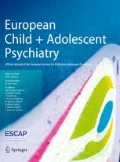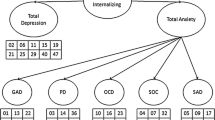Abstract
Background
Previous research has reported lower treatment rates for externalizing disorders among non-Western children as compared to Western children. Ethnic differences in parental detection may be an explanation for this discrepancy.
Aims
In a cross-sectional study among the four largest ethnic groups in the Netherlands, namely Dutch, Moroccan, Turkish and Surinamese, we examined the influence of ethnicity on parental detection of behavioural disorders.
Method
A total of 270 children (aged 6–10 years) and their parents were interviewed regarding psychiatric disorders and socio-demographic data. Sensitivity and specificity were calculated by using standard definitions, with adjustment for parental educational level.
Results
Sensitivity to detect any externalizing disorder and ADHD in particular was significantly lower among Moroccan and Surinamese parents when compared to Dutch parents. Sensitivity to detect ADHD tended to be lower among Turkish parents. Specificity to detect any externalizing disorder was higher among Moroccan and Turkish parents. Specificity to detect ADHD was higher among Moroccan parents and tended to be higher among Turkish parents.
Conclusions
The detection rate of externalizing disorders is markedly lower among non-Dutch parents than among Dutch parents. This finding emphasizes the importance of taking parents’ cultural context into account when appraising their report on possible externalizing disorders in their children.
Similar content being viewed by others
References
Biederman J, Faraone S, Milberger S, Guite J, Mick E, Chen L, Mennin D, Marrs A, Ouellette C, Moore P, Spencer T, Norman D, Wilens T, Kraus I, Perrin J (1996) A prospective 4-year follow-up study of attention-deficit hyperactivity and related disorders. Arch Gen Psychiatry 53:437–446
Boyle MH, Offord DR, Racine Y, Sanford M, Szatmari P, Fleming JE, Price-Munn N (1993) Evaluation of the Diagnostic Interview for Children and Adolescents for use in general population samples. J Abnorm Child Psychol 21:663–681
Bussing R, Gary FA, Mills TL, Garvan CW (2003) Parental explanatory models of ADHD: gender and cultural variations. Soc Psychiatry Psychiatr Epidemiol 38:563–575
Eapen V, Ghubash R (2004) Help-seeking for mental health problems of children: preferences and attitudes in the United Arab Emirates. Psychol Rep 94:663–667
Erol N, Arslan LB, Akçakin M (1995) The adaptation and standardization of the Child Behavior Checklist among 6–18 year-old Turkish children. In: Sergeant E (eds) Eunethydis: European Approaches to Hyperkinetic Disorder. Fotorotar, Zurich, pp 97–113
Goodman R (1997) The strengths and difficulties questionnaire: a research note. J Child Psychol Psychiatry 38:581–586
Hackett L, Hackett R (1993) Parental ideas of normal and deviant child behaviour. A comparison of two ethnic groups. Br J Psychiatry 162:353–357
Junger M, Terlouw GJ, van der Heijden PGM (1995) Crime, accidents and social control. Crim Behav Mental Health 5:386–410
Kadesjo B, Gillberg C (2001) The comorbidity of ADHD in the general population of Swedish school-age children. J Child Psychol Psychiatry 42:487–492
Kalliopuska M (1992) Social desirability related to social class among adults. Psychol Rep 70:808–810
Kasius MC (1997) Interviewing children. Development of the Dutch version of the Semi-structured Clinical Interview for Children and Adolescents (SCICA) and testing of the psychometric properties. Unpublished doctoral dissertation, Erasmus University, The Netherlands, Rotterdam
Knol FA (1998) Van hoog naar laag; van laag naar hoog (From high to low; from low to high). Sociaal en Cultureel Planbureau, Den Haag
Kosten TA, Rounsaville BJ (1992) Sensitivity of psychiatric diagnosis based on the best estimate procedure. Am J Psychiatry 149:1225–1227
Lambert MC, Weisz JR, Knight F, Desrosiers MF, Overly K, Thesiger C (1992) Jamaican and American adult perspectives on child psychopathology: further exploration of the threshold model. J Consult Clin Psychol 60:146–149
Lewczyk CM, Garland AF, Hurlburt MS, Gearity J, Hough RL (2003) Comparing DISC-IV and clinician diagnoses among youths receiving public mental health services. J Am Acad Child Adolesc Psychiatry 42:349–356
Mann EM, Ikeda Y, Mueller CW, Takahashi A (1992) Cross-cultural differences in rating hyperactive-disruptive behaviors in children. Am J Psychiatry 149:1539–1542
Mannuzza S, Klein RG, Konig PH, Giampino TL (1989) Hyperactive boys almost grown up. IV. Criminality and its relationship to psychiatric status. Arch Gen Psychiatry 46:1073–1079
McConaughy SH, Achenbach TM (2001) Manual for the semistructured clinical interview for children and adolescents. University of Vermont, Burlington.
MTA Cooperative Group (1999) A 14-month randomized clinical trial of treatment strategies for attention-deficit/hyperactivity disorder. The MTA Cooperative Group. Multimodal Treatment Study of Children with ADHD. Arch Gen Psychiatry 56:1073–1086
Muris P, Meesters C, Van Den BF (2003) The Strengths and Difficulties Questionnaire (SDQ)–further evidence for its reliability and validity in a community sample of Dutch children and adolescents. Eur Child Adolesc Psychiatry 12:1–8
Pels T (2003) Respect van twee kanten; Een studie over last van Marokkaanse jongeren (The question of respect; A study on misconduct of Moroccan boys) Koninklijke van Gorcum, Assen
Puig M, Lambert MC, Rowan GT, Winfrey T, Lyubansky M, Hannah SD, Hill MF (1999) Behavioral and emotional problems among Jamaican and African American Children, Ages 6 to 11: Teacher Reports versus Direct Observations. J Emotion Behav Disorders 7:240–251
Rothenberger A, Woerner W (2004) Strengths and Difficulties Questionnaire (SDQ)–evaluations and applications. Eur Child Adolesc Psychiatry 13(Suppl 2):II1–II2
Safer DJ, Malever M (2000) Stimulant treatment in Maryland public schools. Pediatrics 106:533–539
Satterfield JH, Schell A (1997) A prospective study of hyperactive boys with conduct problems and normal boys: adolescent and adult criminality. J Am Acad Child Adolesc Psychiatry 36:1726–1735
Sayal K, Taylor E, Beecham J, Byrne P (2002) Pathways to care in children at risk of attention-deficit hyperactivity disorder. Br J Psychiatry 181:43–48
Schwab-Stone ME, Shaffer D, Dulcan MK, Jensen PS, Fisher P, Bird HR, Goodman SH, Lahey BB, Lichtman JH, Canino G, Rubio-Stipec M, Rae DS (1996) Criterion validity of the NIMH Diagnostic Interview Schedule for Children Version 2.3 (DISC-2.3). J Am Acad Child Adolesc Psychiatry 35:878–888
Shaffer D, Fisher P, Lucas CP, Duldan MK, Schwab-Stone ME (2000) NIMH Diagnostic Interview Schedule for Children Version IV (NIMH DISC-IV): Description, differences from previous versions, and reliability of some common diagnoses. J Am Acad Child Adolesc Psychiatry 39:28–38
Sonuga-Barke EJS, Minocha K (1993) Inter-ethnic bias in teachers’ ratings of childhood hyperactivity. Br J Dev Psychol 11:187–200
Stevens GW, Pels T, Bengi-Arslan L, Verhulst FC, Vollebergh WA, Crijnen AA (2003) Parent, teacher and self-reported problem behavior in The Netherlands: comparing Moroccan immigrant with Dutch and with Turkish immigrant children and adolescents. Soc Psychiatry Psychiatr Epidemiol 38:576–585
Van Widenfelt BM, Goedhart AW, Treffers PD, Goodman R (2003) Dutch version of the Strengths and Difficulties Questionnaire (SDQ). Eur Child Adolesc Psychiatry 12:281–289
Weisz JR, Chaiyasit W, Weiss B, Eastman KL, Jackson EW (1995) A multimethod study of problem behavior among Thai and American children in school: teacher reports versus direct observations. Child Dev 66:402–415
Weisz JR, McCarty CA (1999) Can we trust parent reports in research on cultural and ethnic differences in child psychopathology? Using the bicultural family design to test parental culture effects. J Abnorm Psychol 108:598–605
Zwirs BWC, Burger H, Schulpen TWJ, Buitelaar JK (xxxx) Prevalence of psychiatric disorders among children of different ethnic origin. Manuscript submitted for publication.
Zwirs BWC, Burger H, Schulpen TWJ, Buitelaar JK (2006) Different treatment thresholds in non-Western children with behavioral problems. J Am Acad Child Adolesc Psychiatry 45(4):476–483
Acknowledgments
This study was financially supported by The Netherlands Organization for Scientific Research (ZON-MW), grant number 99–9.1–64, by the Foundation for Children’s Welfare Stamps Netherlands and by the Province of Utrecht, The Netherlands.
Author information
Authors and Affiliations
Corresponding author
Rights and permissions
About this article
Cite this article
Zwirs, B.W., Burger, H., Buitelaar, J.K. et al. Ethnic differences in parental detection of externalizing disorders. Eur Child Adolesc Psychiatry 15, 418–426 (2006). https://doi.org/10.1007/s00787-006-0550-7
Accepted:
Published:
Issue Date:
DOI: https://doi.org/10.1007/s00787-006-0550-7



